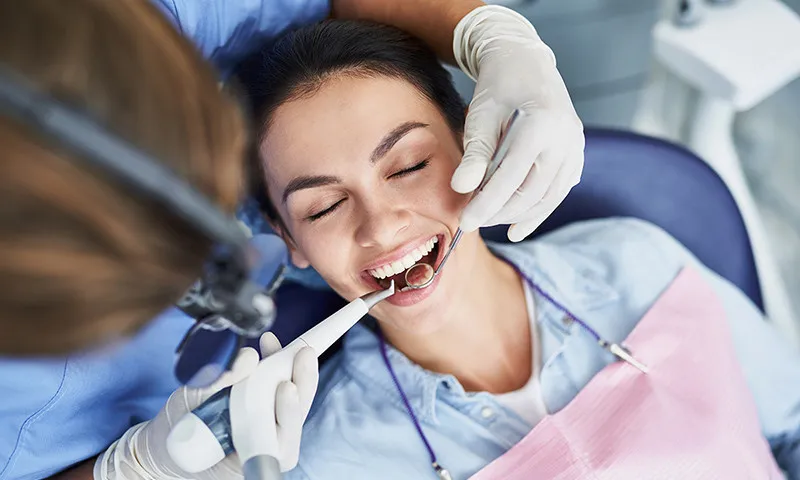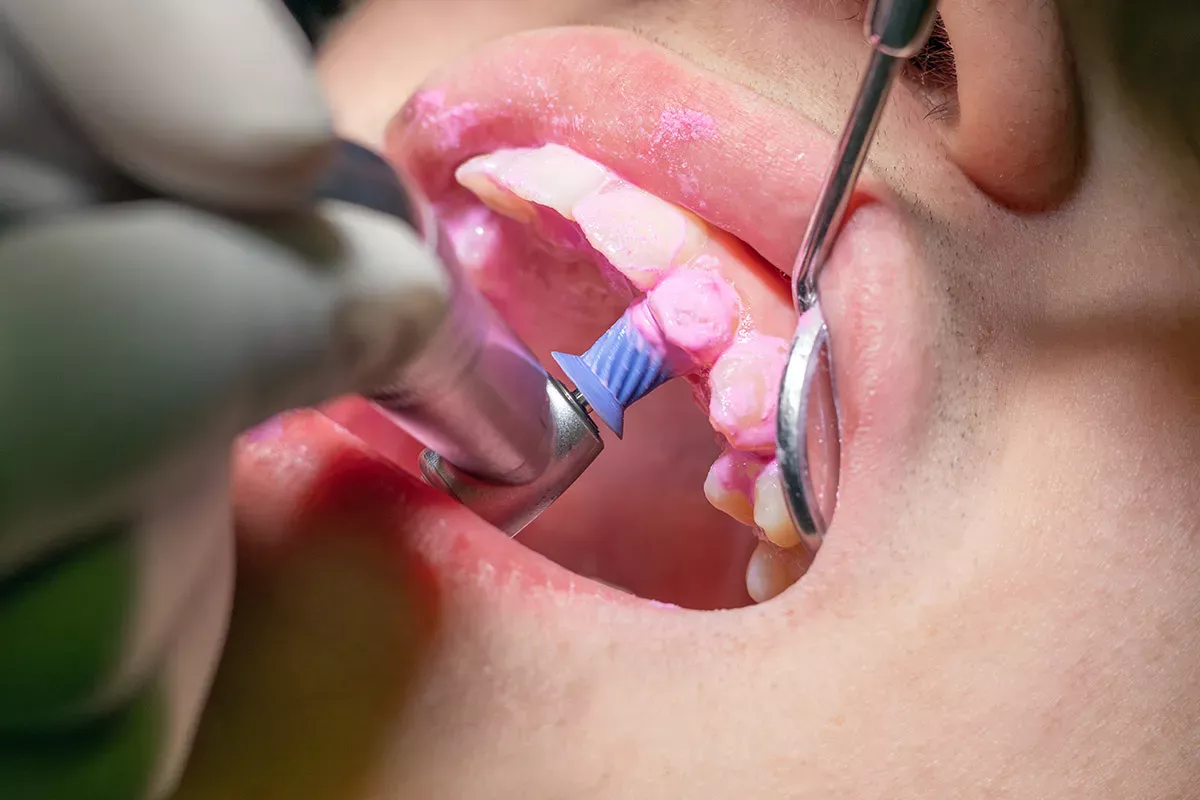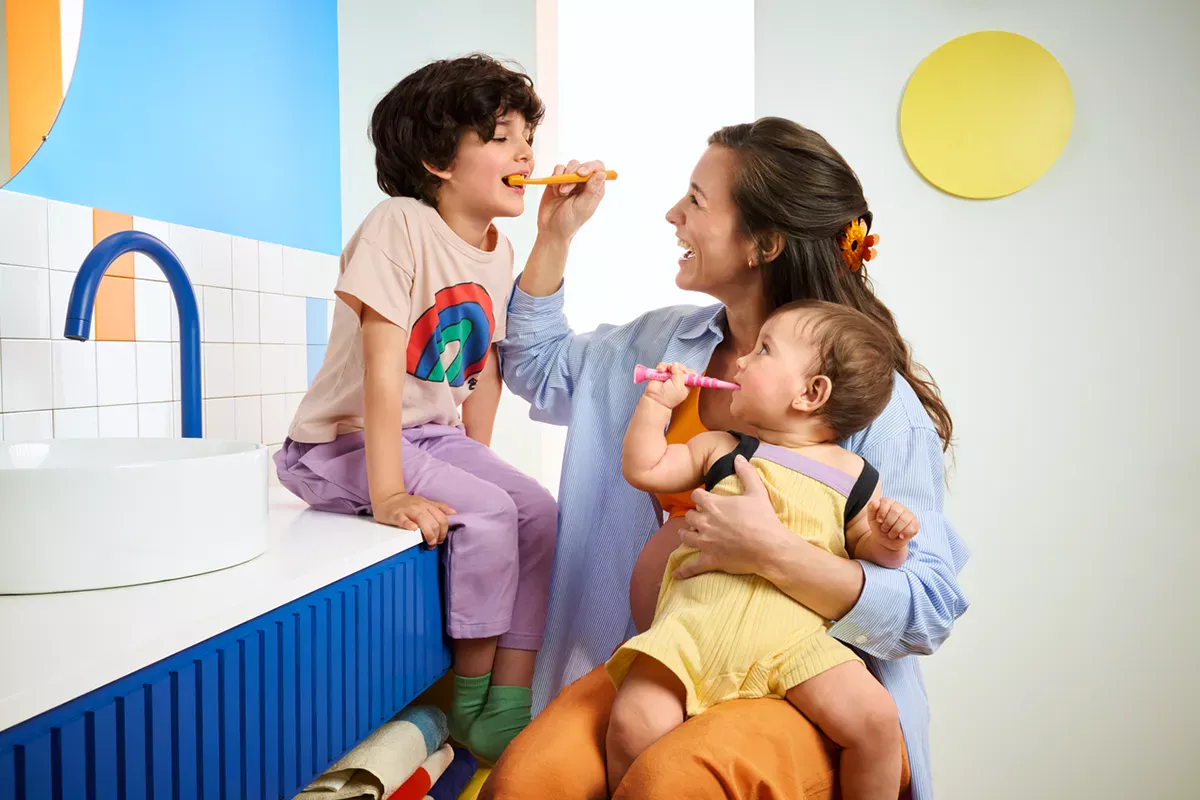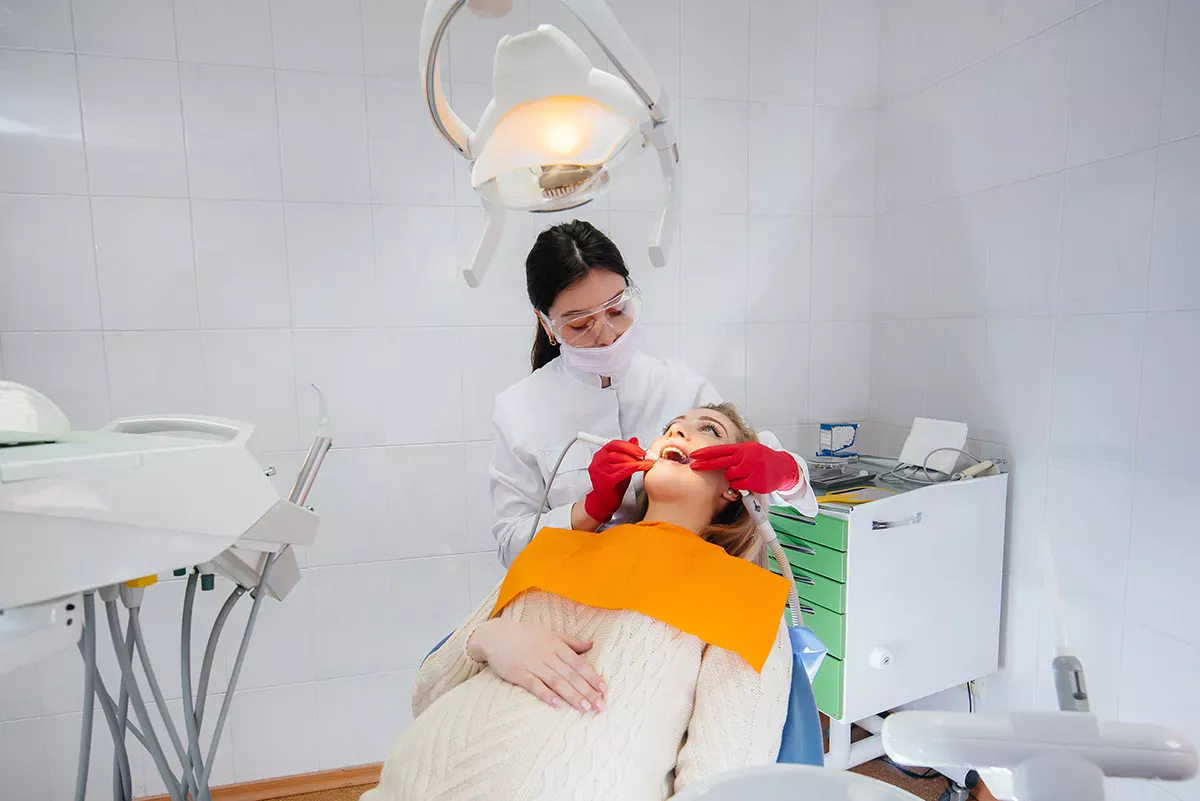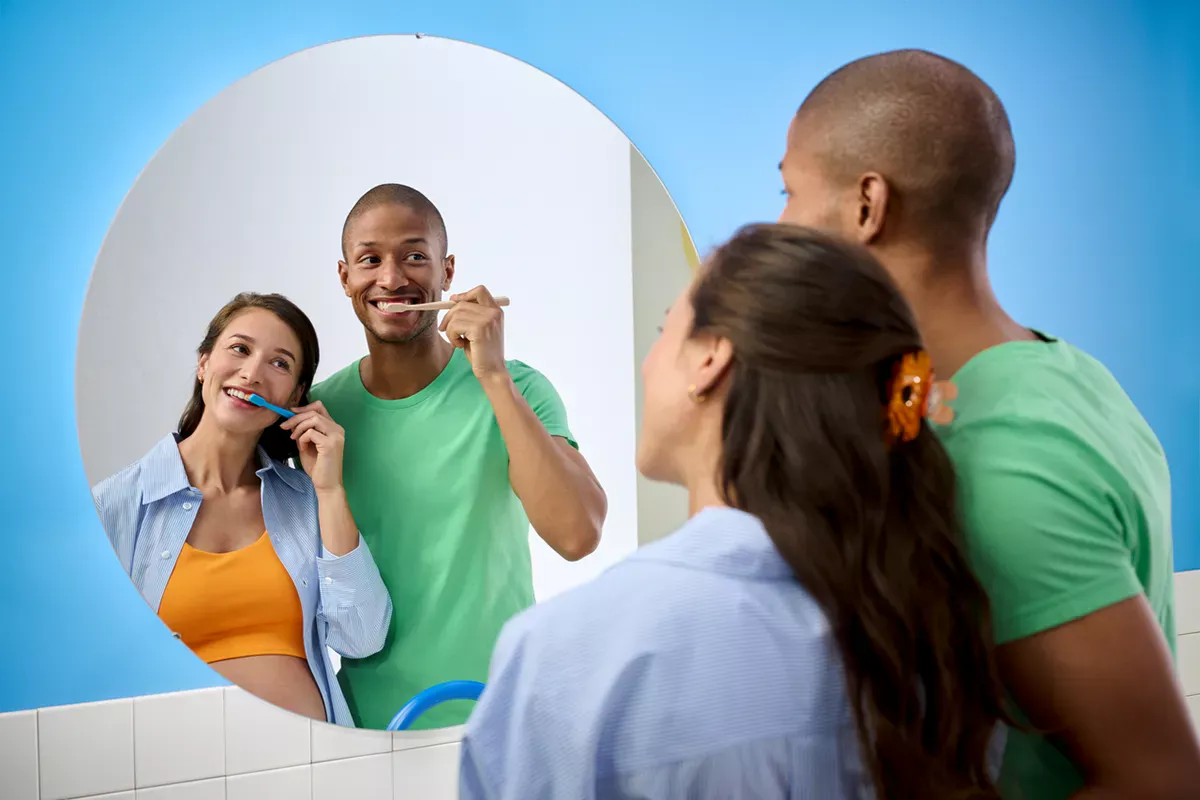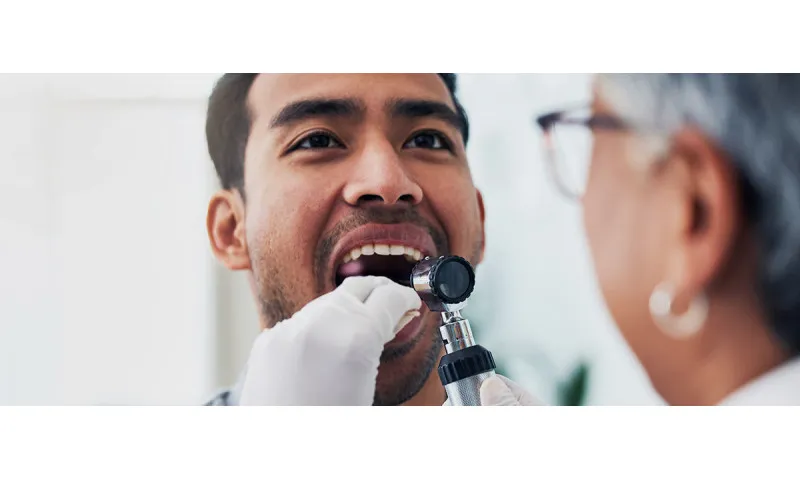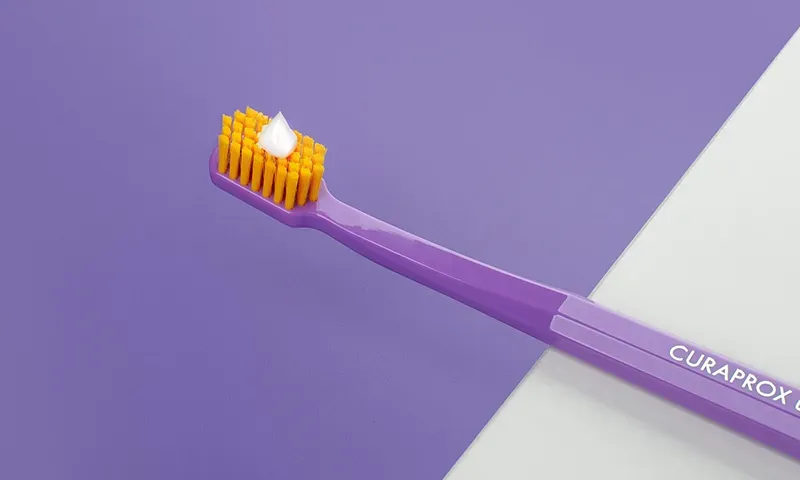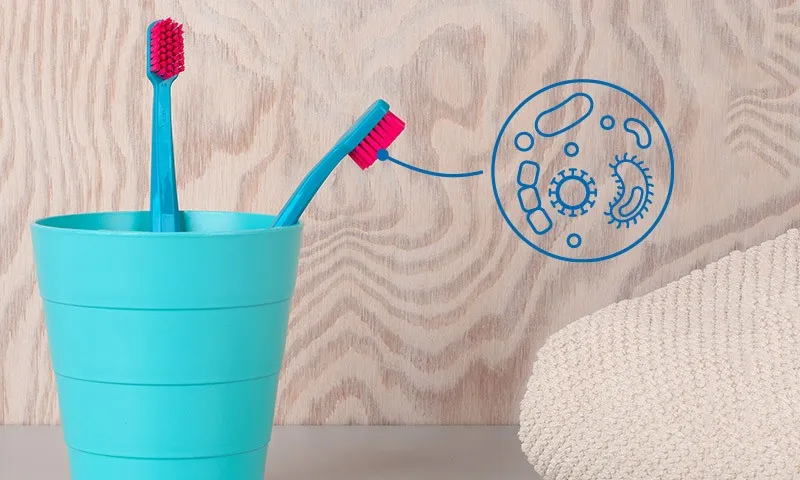Why go for professional teeth cleaning?
For most people, brushing their teeth twice a day is a natural part of their daily routine. Now you might ask: Why do you need to make an appointment at the dental practice to have your teeth professionally cleaned? The question is actually easy to answer: Because we all fail to really manage to continuously and completely remove plaque from our teeth - even if our oral hygiene is exemplary and conscientious and we use interdental brushes for the spaces between our teeth in addition to a toothbrush. This forms the perfect basis for clean and healthy teeth. But it will always happen that we don't clean one or two places in the mouth - there are simply too many niches in our mouths for that.
And it is precisely in these nooks and crannies that plaque can quietly and secretly settle. This biofilm on our teeth, which is full of caries bacteria, then develops into tartar in the long term, an extremely stubborn plaque that doctors also call calculus dentis. We cannot remove this tartar ourselves, only dental experts can do so with a professional dental cleaning. If the tartar remains in place, it can damage our dental health and trigger gingivitis (inflammation of the gums) or periodontitis, for example - an infectious disease of the entire periodontium.
Good to know:
Would you like to find out more about how and why tartar forms? Then read on in our article on the subject:
What happens during professional teeth cleaning?
Professional teeth cleaning (PZR) is an intensive cleaning that dental experts (less often dentists themselves) with special training carry out in a dental practice. They remove all soft and hard plaque on the surface of your teeth, in the spaces between your teeth and in the so-called gum pockets, if you have any.
Gum pockets are a symptom of existing damage to the periodontium caused by gingivitis and periodontitis. In this case, the gums detach from the tooth, resulting in gum pockets. Pathogenic bacteria can lodge and hide in them particularly well. The deeper these "pockets" are, the more difficult they are to clean.
Good to know:
Almost one in two people is affected by periodontitis - an inflammation of the tooth bed and periodontium. Read here how you can prevent it:
Procedure of a PZR - What is done?
A professional dental cleaning always varies slightly from dental practice to dental practice; there is no absolute standard procedure. However, the German Dental Association has defined the technical content of a professional dental cleaning, which we would like to present to you here.
Tip: If you want to know exactly what to expect in advance, simply talk openly with your dentist - he or she will certainly take the time to explain the procedure to you. This is usually particularly important for people who are afraid of the dentist. They should not be afraid to ask all their questions in advance.
You can also find out more about dealing with dental anxiety in our article "What can you do about dental anxiety?".
First step: Remove hard coatings
At the beginning of a PZR, the specialists at the dental practice will first thoroughly examine your teeth. You may also gargle with a mouthwash beforehand to disinfect and clean your teeth and gums before the treatment. Tip: Brush your teeth very thoroughly at home. This will allow the dental experts to start their actual work quickly and not have to worry about cleaning your mouth first.
Then it really gets going: using a wide variety of tools, such as hand instruments or ultrasonic devices, we now tackle pathogenic plaque and bacteria on your teeth, in the spaces between your teeth and also below the gum line. The hard plaque, i.e. tartar, is tackled first. To make it easier to recognise these plaque deposits, some dental experts colour the teeth in advance with plaque colouring tablets. This makes the plaque on your teeth stand out clearly and can be removed in a more targeted manner. In addition, the appearance is often impressive for patients, who usually believe that they have brushed very well. They are often surprised by the often quite extensive blue or red coloured areas.
Second step: Remove soft coverings
Once the tartar has been removed, it is the turn of the soft plaque. Here, too, a wide variety of cleaning techniques can be used with manual and electric instruments:
- Interdental brushes
- Dental floss
- Ultrasonic
- Powder jet
- Sandblasting
- Airflow
- Water jets
Good to know:
Have you ever heard of the so-called Airflow powder jet technique? This is a method of professional tooth cleaning in which a mixture of air, water and salt is sprayed into the interdental spaces and cleaned using a high-pressure process. This means that even hard-to-reach areas are cleaned.
Third step: Polishing
Once the gums and teeth have been freed from pathogenic bacteria and plaque, it's time for the "finishing touches", so to speak. This means that your teeth are now polished so that the surfaces are nice and smooth again. After the plaque has been removed, they are initially rough - and this is exactly what caries bacteria particularly like; this is exactly where they love to settle. They find it much more difficult to do this on smooth surfaces and so new plaque cannot form as quickly. Your teeth are polished with a rotating brush and a polishing paste. Many patients find this step of professional teeth cleaning very pleasant.
Good to know:
Brushing your teeth needs to be learnt. Because if we use the wrong technique, we can actually cause damage to our mouths. Find out how to do it properly in our article:
Fourth step: Fluoridation
At the end of a professional dental cleaning, your teeth are usually fluoridated with a varnish or gel. This strengthens your tooth enamel and protects your teeth against tooth decay.
Fifth step: Advice on correct oral hygiene
After about 45 to 60 minutes, you are usually discharged from the professional dental cleaning. Before you go home, however, you will usually receive some valuable tips from the dental expert on how you can maintain the sparkling clean result at home for as long as possible. After all, an appointment for professional teeth cleaning is of course no substitute for daily dental care. Brushing your teeth regularly in your own bathroom is and remains the cornerstone of your oral health.
Excursus: White teeth through PZR?
In fact, during a professional teeth cleaning, the specialists can also remove slight discolouration on your teeth caused by the consumption of coffee, black tea, red wine or cigarettes, for example. However, it is important to realise that a professional teeth cleaning is first and foremost a medical treatment. Hopes of radiantly bright and white teeth at the end of the treatment should therefore not be too high, as our natural tooth colour usually tends towards beige or even yellow. Before and after pictures on the internet, which are supposed to illustrate the effect of professional teeth cleaning, are often misleading. However, such pictures are often simply heavily edited.
If you suffer from the colour of your teeth and would like brighter teeth, simply talk to your dentist about it. He or she can advise you on what options are available to improve the appearance of your teeth. In our article "Tooth discolouration: Where they come from and how to get rid of them", you can also read in advance which treatments may be possible - and which you're better off avoiding.
Good to know:
Do you want a gentle whitening effect for your teeth? The 'Black is White' activated charcoal toothpaste from Curaprox "soaks up" unsightly discolouration without sanding. Triple-action enzymes and fluoride also protect your teeth from tooth decay.
At what age should I have my teeth professionally cleaned?
Parents in particular often ask themselves: At what age should children have their teeth professionally cleaned? Unfortunately, there is no standard answer to this question. Dentists make different recommendations here. One thing is certain: From the first milk tooth, brushing teeth should be part of the daily routine. Brushing milk teeth in particular is essential, as the usually bright white teeth have thinner enamel and are less mineralised than the permanent teeth - they are therefore more susceptible to tooth decay.
Good to know:
Brushing teeth from the very first tooth is particularly gentle and effective with the baby toothbrush from Curaprox. The rubberised head with lots of soft bristles protects the sensitive oral mucosa. Another plus point: the toothbrush is free from harmful substances such as bisphenol A (BPA), phthalates or azo dyes and is therefore completely harmless.
From the age of around six, however, many dental practices already carry out professional teeth cleaning for children. However, health insurance companies do not usually pay for this service. The procedure for such a dental cleaning is similar to that described above. Of course, the dental experts treating the child should pay attention to how tolerant the child is towards the treatment. Many children really "fight back" or are simply afraid. In this case, it is important to explain the procedure to the child. It is then certainly helpful to visit a dentist who specialises in children.
However, professional teeth cleaning - as we adults know it - is not usually possible for very young children. This requires a good dose of patience, which many young children are not yet able to muster. Sitting still for long periods of time also gets in the way. For small children, extensive professional teeth cleaning is generally not yet necessary. Most dentists tend to emphasise educating parents about proper dental care for their children, thereby laying the foundation for good oral hygiene at home. Plaque-colouring tablets, also known as tooth-colouring tablets, are often used here. This allows children and parents to see immediately where teeth have not been cleaned properly.
Would you like to find out more about the best way to brush your child's teeth and when they can do it without you? Then read all about it in our article "Brushing children's teeth properly".
How often is a professional dental cleaning useful?
It is not specified how often you should go for a dental cleaning. In general, dentists recommend making an appointment once or twice a year. This is especially true for patients who have healthy teeth and gums. However, professional dental cleaning may also be recommended more often - for example, if certain risk factors are present that jeopardise oral health. These include:
- Consumption of cigarettes
- Insufficient oral hygiene and many hard-to-reach areas
- Presence of implants or extensive dentures
- If periodontitis treatment has taken place or will take place
- Presence of certain diseases such as diabetes
As you can see, the frequency of professional teeth cleaning is very individual. Some people only need it once a year - others even 4 times a year. It's best to speak openly with your dentist about the frequency he or she thinks makes sense for you.
PZR during pregnancy: Highly recommended!
The good news first: even if you're pregnant, there's nothing to stop you making an appointment for a professional dental cleaning. Better still, it is highly recommended. Why is that? We've put together a few reasons here.
Protection against gingivitis and periodontitis
Pregnancy affects the whole body - and therefore also the teeth and gums. For example, up to 80 per cent of pregnant women suffer from inflammation of the gums, also known as pregnancy gingivitis. The reason for this is that bacteria have an easier time during pregnancy. The hormonal change ensures that the connective tissue throughout the body is loosened so that the baby has room to grow. This change also makes the gums looser so that bacteria can penetrate particularly easily.
If pregnancy gingivitis is not treated, for example with a professional dental cleaning, periodontitis can develop - an inflammation of the entire periodontium, which in the worst case can loosen the teeth and even result in tooth loss.
The periodontitis bacteria in the mother's mouth are also harmful to the baby. The mother swallows them with her saliva every day, which means they can also enter her bloodstream and reach the placenta. Studies have shown that pregnancy gingivitis or periodontitis increases the risk of premature birth or miscarriage at the beginning of pregnancy. Inflammation in the mouth can be recognised at an early stage and remedied with a professional dental cleaning. It would even be a good idea to have a check-up at the dentist while you are still trying to conceive and to have any treatment done in advance.
Protection from tooth decay
Pregnant women have an increased risk of developing tooth decay. This is because the pH value of saliva is lower than usual during pregnancy. This reduces the protective function of saliva. Caries bacteria, which metabolise the sugar in the plaque into acid, can then attack the tooth enamel much more easily. The pregnancy hormones also have an influence on the formation of dental plaque.
Good to know:
Are you looking for tips and advice on optimal dental care during pregnancy? Then read on here:
In addition, pregnant women often have cravings for sweet or sour foods. Regardless of whether the acid comes directly from the orange juice or lemonade or the chocolate first has to be metabolised into acid - these foods endanger your dental health and increase the risk of tooth decay.
Protection against sensitive teeth due to morning sickness
Another reason in favour of professional teeth cleaning during pregnancy is that many women suffer from nausea and vomiting, especially in the first few weeks. This is also detrimental to oral health, as vomiting weakens the enamel and plaque can accumulate more easily on the teeth and gums.
Anaesthesia during PZR: Is it possible?
Normally, professional teeth cleaning should not cause any pain. This is especially true if you have no complaints such as gum inflammation or open tooth necks. Nevertheless, patients sometimes report unpleasant sensations during treatment. This can happen if the dentist uses hand tools or electrical devices to remove the hard tartar. If you have sensitive teeth or are simply afraid of dental treatment, speak to the dental professionals in confidence. The dental experts will then proceed with particular care and ask you how you are feeling every now and then.
Good to know:
Do you have gum inflammation or very sensitive teeth? Then the CS 12460 Velvet toothbrush from Curaprox will help you to brush your teeth gently and carefully. It has 12,460 soft bristles that adapt to the tooth surface without irritating your gums. By comparison, a conventional toothbrush usually has around 500 bristles.
There are other reasons why patients may feel pain during a dental cleaning. There is a risk if the teeth are damaged (e.g. due to caries) or if there is inflammation of the gums. In such cases, some dentists offer to treat the sensitive areas with a local anaesthetic. This is also known as a surface anaesthetic and can be applied as a gel, for example.
Very important: Don't just do it yourself and avoid taking painkillers before the PZR for fear of pain. Aspirin, for example, has a blood-thinning effect. This can cause your gums to bleed during the professional dental cleaning.
What to eat after professional teeth cleaning?
Although a dental cleaning makes your teeth wonderfully clean, it also makes them temporarily particularly vulnerable. This is because the enamel membrane, the very thin protective film over the teeth (in medical terms: pellicle), is also removed during cleaning - unfortunately, this cannot be prevented. This protective film forms again after about two hours. During this time, it would therefore be a good idea to avoid eating and drinking altogether if possible.
Even in the hours following your teeth cleaning, you can't go wrong if you try to avoid colouring foods such as coffee, beetroot, tea, red wine or berries. Because your teeth are susceptible after the cleaning, you should also avoid acidic or sugary foods.
For smokers, it is best to avoid cigarettes for around eight hours. This is because not only the teeth but also the gums are sensitive after a professional dental cleaning. The smoke causes unnecessary irritation.
Costs of professional teeth cleaning
Professional teeth cleaning is not a general statutory health insurance benefit. This means that patients have to pay for it out of their own pocket. How much the PZR costs is to a certain extent a matter for the respective dental practice. The amount is calculated according to the time required and the degree of difficulty. Factors that play a role in this are, for example
- Condition of the teeth
- Type of dental plaque
- Extent of dental plaque
- Cause of dental plaque
The methods and materials used also play a role in the calculation of the price. The qualifications of the respective employee are also taken into account.
Despite all the individuality, there is still a cost framework within which dentists must operate. This framework is defined by the private scale of fees for dentists (GOZ). Billing must be based on GOZ number 1040 - per tooth. So let's assume that a patient comes for professional teeth cleaning with a full set of teeth without wisdom teeth, i.e. with 28 teeth. Then the number 1040 is applied 28 times. There is a certain amount of leeway here. This is because each fee item is assigned an increase factor. If the dentist charges according to the 1.0-fold rate, cleaning a tooth costs 1.57 euros. According to the 2.3-fold rate it is 3.62 euros and according to the 3.5-fold rate it is 5.51 euros.
If dentists charge according to the 2.3-fold rate, they usually cite special circumstances, exceptional difficulties or particularly long treatment times as justification. If none of these "complications" exist, an increase in the price above the 2.3-fold rate is not permitted.
For patients, this means that it is essential to ask for a quote before undergoing professional cleaning! If the price is less than 80 euros or more than 120 euros, the offer can be considered quite dubious. Higher prices in particular are more likely to be money-making. It also doesn't hurt to enquire at several practices to get a good impression of price variations. Also enquire about the cost of anaesthesia if you wish to have it.
Minimise PZR costs with supplementary dental insurance?
As health insurance companies do not usually pay for professional dental cleaning, it is possible to take out private supplementary dental insurance. There are a wide variety of offers on the market. High-quality supplementary dental tariffs, for example, offer up to 120 euros reimbursement or more per year for a professional dental cleaning. However, you can of course also opt for a cheaper insurance policy that simply allows you to reduce your own contribution a little. In addition, many insurers also offer a so-called PZR flat rate. This usually means that your professional dental cleaning is paid for 100 per cent. The number of appointments doesn't matter either - the insurance covers everything.
The question is whether one of the insurance policies described above is necessary for you in your case. This is of course a very individual decision. In general, you should think about how often you go for professional teeth cleaning and what you pay for it. For example, if your teeth are completely healthy and one appointment per year is completely sufficient for you, a "flat rate" probably doesn't make sense for you. If we assume that you pay 100 euros a year for this one dental cleaning, you would make a loss with flat-rate insurance. This is because these insurances often charge around 15 euros per month.
However, this is just one of many possible bills. There are also insurance companies that offer a PZR flat rate for even less money. Or: They charge more, but offer additional services such as participation in fillings, root canal or periodontitis treatments. So if you are really looking for supplementary dental insurance, you should invest time beforehand to compare different insurers and their offers. You can find lots of comparison portals on the Internet to help you do this.
Good to know:
Even if it would be nice, of course: the costs of professional dental cleaning are not tax-deductible - it is a voluntary preventive examination and does not count as an extraordinary expense.
PZR and aid
The so-called allowance is part of the health insurance system for civil servants and judges. These professional groups are obliged to insure themselves with a private health insurance company. Through the allowance, the state contributes to certain costs for illness, care and childbirth. Professional dental cleaning is eligible for state aid. Incidentally, employees in the public sector are also entitled to benefits.
Professional teeth cleaning at home - is it possible?
As the name suggests, professional teeth cleaning should be left to professionals. It therefore makes perfect sense to make an appointment at a dental practice and trust dental experts with their special methods and equipment. After all, the main aim of a dental cleaning is to remove very stubborn tartar from our teeth. This is no easy task and - if done incorrectly - can also damage our teeth.
Nevertheless, there are plenty of products that advertise the ability to remove tartar yourself at home. For example, you can order a tartar remover or a tooth scraper on the internet - here you can find everything from a hand-held device to an electric ultrasonic version. To get at least some certainty when choosing such a device, you should look around before buying to see if you can find tests at Stiftung Warentest or similar institutions that scrutinise such devices for home use.
However, please bear in mind that there is always a risk of using such devices incorrectly. Our teeth are sensitive. It can quickly happen that you damage your enamel and make your teeth much more susceptible to tooth decay, for example. We therefore generally recommend having your teeth professionally cleaned in a dental practice and focussing on brushing your teeth properly at home.
Are there any disadvantages to professional teeth cleaning?
It must be emphasised in advance: The German Dental Association attaches great importance to professional teeth cleaning and sees it as an ideal complement to brushing your teeth at home. Together, the two are the ideal preventative measure for healthy teeth and gums.
Nevertheless, as with all treatments and procedures, there are also some risks and disadvantages, which we have summarised for you here:
Bleeding
Your gums may well bleed during a dental cleaning. This is not a bad thing at first. It usually occurs because there is a slight inflammation of the gums, which should then improve as a result of the professional dental cleaning. Of course, minor injuries in the oral cavity can always occur during a professional dental cleaning, which can cause bleeding. Such bleeding harbours the risk of pathogens entering the body and triggering an infection. To prevent this, a disinfectant mouthwash is therefore standard in dental surgeries before the PZR.
Pain
As you have already learnt above, professional teeth cleaning can sometimes be a little painful - for example, if you suffer from sensitive teeth, exposed tooth necks or gum inflammation. Of course, this is one of the disadvantages of a professional dental cleaning, but it shouldn't put you off. Any pain is usually really limited. And if you are more anxious, many dental practices offer the option of a local anaesthetic.
Only short-term effect
If you've ever had a professional dental cleaning, you'll know how smooth and clean your teeth feel afterwards. Unfortunately, this doesn't actually last long. At the latest with the first meal after the PZR, a biofilm with caries bacteria will cover your teeth again, which will turn into tartar without regular oral hygiene. In other words, you really need to pay close attention to conscientious oral hygiene at home and should not assume that an annual or six-monthly dental cleaning will prevent the worst from happening.
Costs
You have already learnt that health insurance companies generally do not cover the costs of professional teeth cleaning. The rather high prices of between 80 and even 150 euros are therefore clearly one of the disadvantages of a professional dental cleaning.
Good to know:
Regular tooth brushing is essential for healthy teeth. Many people easily forget their interdental spaces - the perfect hiding place for caries bacteria. With the interdental brushes from Curaprox, they don't stand a chance. The different sizes ensure that even the smallest niche is cleaned with just one brushing movement.
Sources:
Ankerzahn e.V.: Professional teeth cleaning.
ARD Gesund: Professional teeth cleaning - what are the real benefits?
AllDent Dental Centre: The methods of professional tooth cleaning.
Bundeszahnärztekammer: Paediatric and: Paediatric and adolescent dentistry and: Professional tooth cleaning.
German dental insurance service: ZR-Flatrate - compare directly here.
ddb Beamtenbund und Tarifunion: Beihilfe.
The 5-star practice Dr Gal: Afraid of professional teeth cleaning? You should know this!
Dr Gebauer and colleagues: Professional teeth cleaning.
Initiative ProDente: Professional tooth cleaning.
National Association of Statutory Health Insurance Physicians: Professional tooth cleaning.
MediKompass GmbH: GOZ 1040: Professional tooth cleaning.
NDR.de: Professional teeth cleaning: What's the real benefit?
Consumer advice centre: Professional tooth cleaning (PZR): What you should know about it and: What dental care does health insurance pay for?
Vereinigte Lohnsteuerhilfe e.V.: PZR: Professional dental cleaning tax deductible?
All websites last accessed on 31/01/2024.
 Swiss premium oral care
Swiss premium oral care
